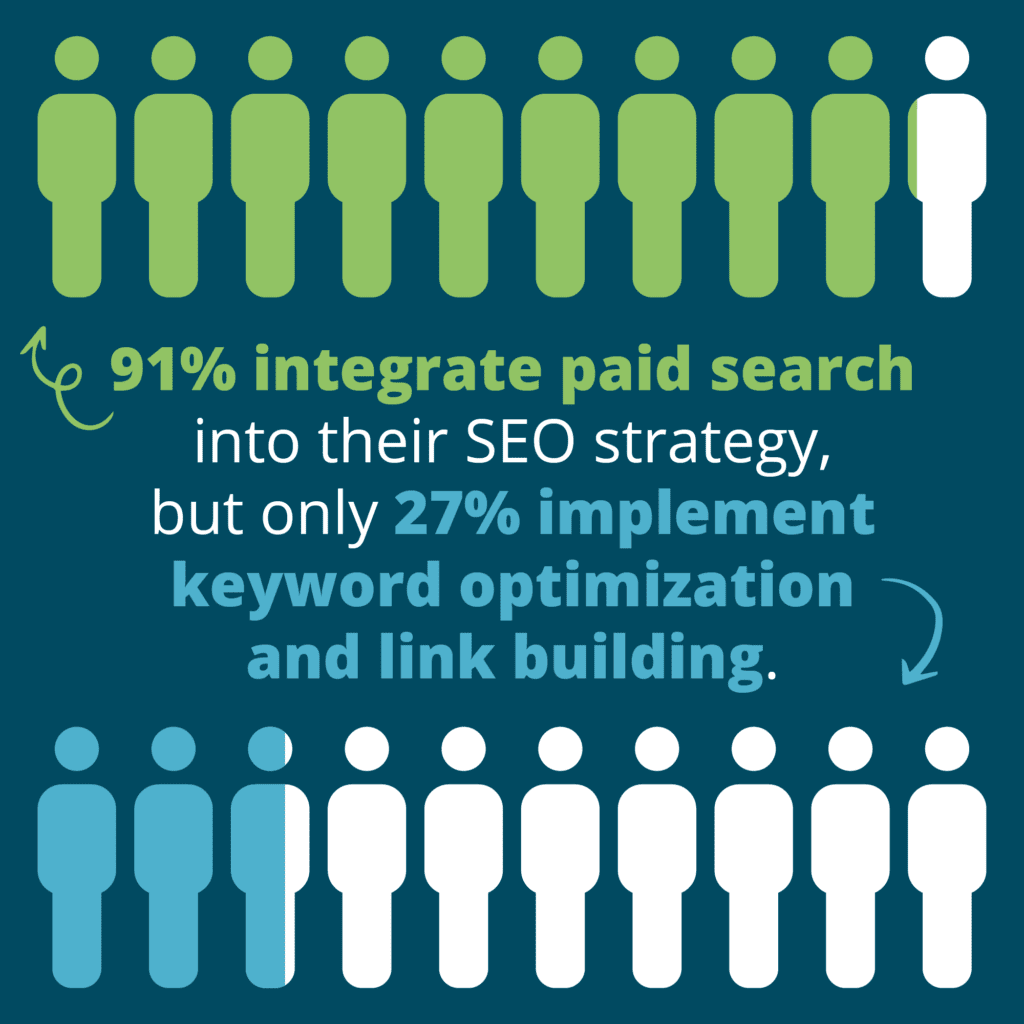Industry Insights
Valuable insights from UPCEA's trusted corporate partners.
Paid Search & SEO in Higher Ed: Are Our Search Marketing Priorities Right?
Key Insights
- The majority of Professional, Continuing, and Online Education units prioritize paid search advertising. This shows that institutions view search as an important part of a prospect’s journey — but a much smaller portion invest in SEO.
- Search engine optimization is worthy of ongoing investment. However, university marketing units and outsourced marketing providers don’t make a compelling case to deans and decision-makers that they should invest in it.
- PCO units can make better short- and long-term marketing investments and reduce their dependency on paid search advertising by learning more about the relationship between paid and organic search and the prospect’s journey in search.
In our three-part Higher Education SEO Research Study, conducted in partnership with the University Professional Continuing Education Association (UPCEA), our goal was to understand higher ed and marketing leaders’ perspectives on SEO and find out the “SEO readiness” of PCO units within higher ed institutions.
As an SEO marketer for more than 12 years, I’ve seen the broader marketing world’s knowledge of SEO grow over time, but there remains a gap in knowledge in many industries, including higher education.
Our research study results confirmed this.
One promising finding is that higher education marketers seem to understand that prospective students are searching online during their journey to higher education, and it’s necessary to have a presence in search results.
The study makes it clear: A staggering 91% of survey respondents said they integrate paid search into the PCO unit’s strategy.
On the other hand, only 27% strongly agreed with the following statements:
- My marketing department has a process for optimizing website content for targeted keywords.
- My marketing department intentionally builds links to grow our website’s search engine authority.

These findings beg the question: Why are higher ed institutions failing to prioritize core SEO tactics when they know search is a critical part of the prospect’s journey? This may be due to a lack of internal resource (talent and dollars) allocation and a deficit in the SEO chops of outsourced higher ed marketing partners.
The disparity between paid search and SEO prioritization, combined with the 58.6 / 100 SEO Readiness Score, indicates that PCO marketing units may lack the foundational understanding of search engine marketing. In particular, they need education around how paid search and SEO differ from one another, how they are connected, and what tactics they should prioritize to support (and optimize the potential of) both.
Without SEO, Higher Ed Marketers Miss Out on Prospects in Two Out of Three Critical Stages of the Funnel
Here’s the issue — the majority of paid search campaigns are tailored toward prospects in the middle of the marketing funnel, the “consideration phase.” These paid campaigns serve up results for keywords such as “online HR degree,” which are great for prospects looking for your top programs. However, this narrow approach might cause you to miss out on other curious searchers.
Without proper SEO, students won’t see your PCO unit in the awareness and decision stages of their search journey.
Awareness-stage prospects looking for career growth info could find a blog post about the demand for graduates with a certain degree. In the decision phase, prospects may be searching specific brand keywords related to registration dates or the application process — and your best information for these searches might not be found.
With a higher education marketing strategy focusing on paid search alone, you may also miss out on more skeptical searchers. According to Forbes, some users find organic search results more trustworthy than those showing up in sponsored positions. This level of trust leads to more than just a warm, fuzzy feeling. It also means that organic search results earn higher click-through rates than their paid-for counterparts. (However, paid search certainly has a ton of benefits and is a very successful tactic for many organizations.)
When you fully incorporate SEO into your higher education digital marketing strategy, you can ensure you’re considering prospects at each stage in the marketing funnel. A full-funnel approach is the only way to completely nurture leads and turn them into enrolled students.

Why Do Higher Education Marketers Invest In Paid Search Over SEO?
We attribute the disparity in investment in higher education paid search over SEO to a few things:
- SEO is harder to understand (and a well-crafted paid search campaign can also be quite complex if you take advantage of all features available).
- SEO takes continual human effort over time (although paid search needs continual optimization to be most effective).
- Paid search can be easier to tie to enrollment (but it is possible to do this with SEO too).
- Paid search results can be more tangible (and if you know what metrics to track and how to report on SEO success, SEO results can be tangible as well).
- SEO work can be viewed as something that is part of ongoing website development — that doesn’t need a dedicated investment in your higher ed marketing budget (but in order to assure you are truly able to compete on Google, a dedicated SEO investment is as critical as your paid search investment).
It’s apparent: PCO units are not making the best short- and long-term investments for their marketing strategies. In the short term, strategic SEO can benefit paid search advertising results to improve cost efficiency. And in the long term, it creates less dependency on paid search tactics overall.
So, What Should Higher Ed Institutions Do About It?
- Get hungry to learn about the differences and overlaps between SEO and paid search advertising.
- Understand SEO as a long-term play at building authority, relevance, and visibility in search.
- Invest in SEO to develop long-term independence from paid search, ultimately saving money and reducing costs per action.

Get Hungry to Learn About SEO and Paid Search Advertising
As a higher ed marketing agency professional, here are a few key things I wish more clients understood about the relationship between SEO and paid search advertising:
- While nothing in the digital world is permanent, investing in SEO builds the authority of your website, which is a critical brand asset. With paid search, your brand can disappear as soon as you stop spending. Essentially, paid search allows you to rent space to advertise. With SEO, once you’ve earned high-ranking search positions, it can take serious effort by your competition for you to lose that ground.
- SEO and paid search advertising often get lumped into the bucket of “search engine marketing,” but it’s important to understand they are not the same thing. They both hope to achieve the same end — to make a website visible to the qualified prospect actively searching for things you offer. However, the execution is significantly different and requires distinct skill sets. This is why in our SEO and paid search-focused agency, we have SEO strategists and digital advertising strategists — two separate resources who come together to collaborate.
SEO Is a Long-Term Play
SEO is more than just content:
- It’s an investment in technical health and content accessibility for your audience.
- It aims to build your brand’s authority, relevance, and visibility in search results.
- It’s a “marathon, not a sprint.” You can’t expect to “do a little SEO” and suddenly start ranking for all the degrees or certificates in the top spot.
Understand that SEO will require ongoing dedication to both build and earn competitive positions — and then maintain them.

Invest in SEO, Build Greater Independence From Paid Search
When an institution invests in SEO and succeeds at building its website and brand’s authority, relevance, and visibility in search results, they gain a key asset: greater independence from paid search. And that means improved costs per inquiry, lead, or enrollment.
It’s hard to believe, but I’ve seen websites so poorly optimized that they don’t rank organically for their own brand names. Without investment in solving these problems, institutions like these will always depend on paid search to even capture the people searching for them by name!
“Branded search” is a term we use to describe people searching for you by name. As you can imagine, these folks are likely further in their decision-making journey, and you may have already spent marketing dollars on them to make them brand-aware. When your website doesn’t organically rank well for these highly qualified searchers, you depend on bidding on your own brand name through paid search advertising. This is costly!
With a strong branded presence in organic search, you can get those clicks — and free up budget. Then, you can spend that budget on degrees or programs that need more dollars to compete, whether in paid search, SEO, or display.
Conversion-optimized landing pages are best practice, but you’ll often want to also land ad clicks on your website pages. With content optimization through SEO, you can improve your webpage’s quality and positively impact your advertising. This approach ensures that prospects discover valuable information on your landing page, while also boosting your ad relevance, quality score, and ad rank.
These benefits translate into cost savings — stretching your ad budget even further.
Closing the gap in knowledge and prioritization of SEO is crucial for implementing a well-rounded and successful higher education digital marketing strategy. PCO units can strengthen their brand authority, visibility, and relevance in search results by investing in SEO and understanding its critical role alongside paid search. Embracing SEO as a fundamental component of your strategy enables you to effectively engage with prospective students at every stage of their journey, ultimately driving enrollment and long-term institutional success.
Some institutions may need support in the knowledge and expertise related to SEO, some may need support with capacity and time allocation to the effort, and some may need both. Working with an expert higher education marketing agency, like Search Influence, can support both expertise and capacity challenges, and help bridge the gap in your paid search and SEO strategies.
As the head of Search Influence’s account strategy team, Alison Zeringue is passionate about a few key metrics to which her team is accountable: campaign results, the client experience, client retention and growth. Prior to joining Search Influence in 2011, Alison earned her degree in Advertising from LSU’s Manship School and worked as a marketing and advertising liaison for small businesses, nonprofits, and entrepreneurs throughout Louisiana. Today, she enjoys working directly with some of Search Influence’s clients on digital and big-picture strategy and indirectly for others through the training and day-to-day support she provides to account managers.
